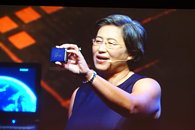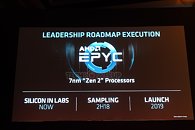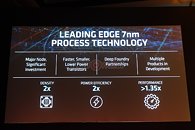- Joined
- Oct 9, 2007
- Messages
- 47,638 (7.44/day)
- Location
- Dublin, Ireland
| System Name | RBMK-1000 |
|---|---|
| Processor | AMD Ryzen 7 5700G |
| Motherboard | Gigabyte B550 AORUS Elite V2 |
| Cooling | DeepCool Gammax L240 V2 |
| Memory | 2x 16GB DDR4-3200 |
| Video Card(s) | Galax RTX 4070 Ti EX |
| Storage | Samsung 990 1TB |
| Display(s) | BenQ 1440p 60 Hz 27-inch |
| Case | Corsair Carbide 100R |
| Audio Device(s) | ASUS SupremeFX S1220A |
| Power Supply | Cooler Master MWE Gold 650W |
| Mouse | ASUS ROG Strix Impact |
| Keyboard | Gamdias Hermes E2 |
| Software | Windows 11 Pro |
AMD in its Computex 2018 address earlier today, mention that its second-generation EPYC enterprise processors will be based on its 7 nanometer "Zen 2" architecture, and not 12 nm "Zen+." The company has the 7 nm silicon ready in its labs, and will begin sampling within the second half of 2018. The first products could launch in 2019, after validations. Besides improved energy-efficiency, the 12 nm "Zen+" architecture features a minor 3-5 percent IPC uplift thanks to improved multi-core clock-speed boosting, and faster caches. "Zen 2," on the other hand, presents AMD with the opportunity to make major design changes to its silicon to achieve higher IPC uplifts. The 7 nm process introduces significant transistor density uplifts over the current process. AMD is in the process of building 4-die multi-chip modules using the 12 nm "Pinnacle Ridge" silicon for its 2nd generation Ryzen Threadripper HEDT client processor family.



View at TechPowerUp Main Site



View at TechPowerUp Main Site






